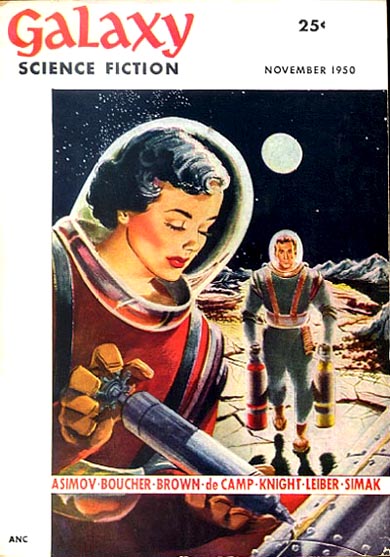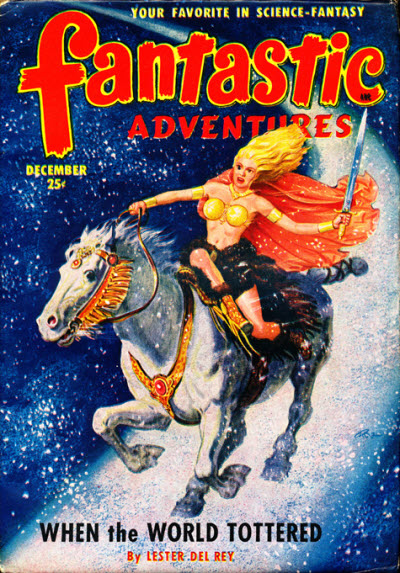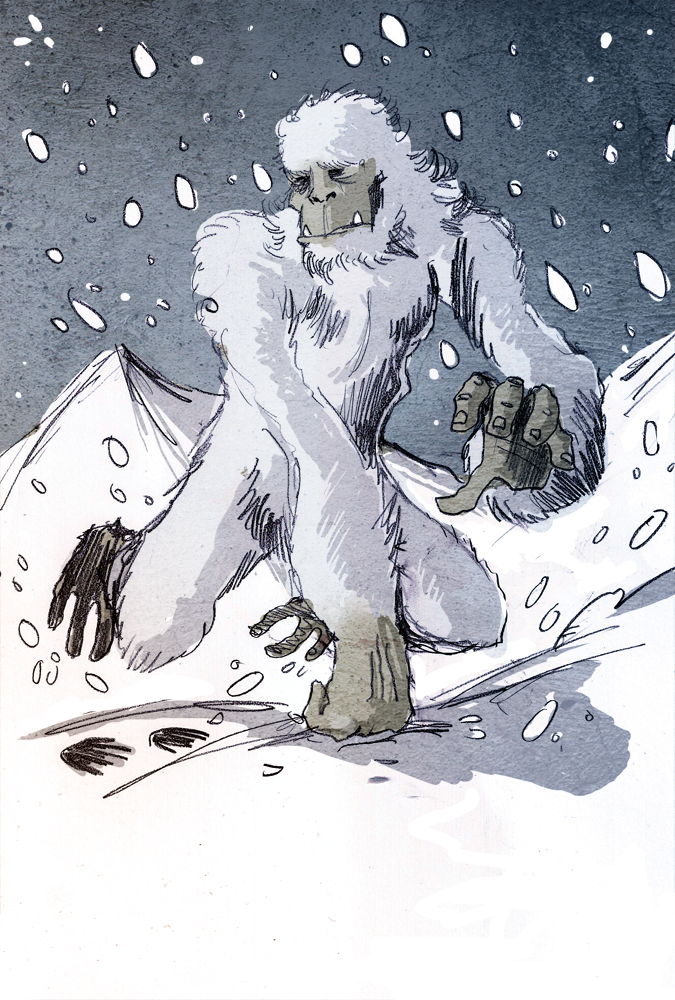|
Fantastic Universe
''Fantastic Universe'' was a U.S. science fiction magazine which began publishing in the 1950s. It ran for 69 issues, from June 1953 to March 1960, under two different publishers. It was part of the explosion of science fiction magazine publishing in the 1950s in the United States, and was moderately successful, outlasting almost all of its competitors. The main editors were Leo Margulies (1954–1956) and Hans Stefan Santesson (1956–1960); under Santesson's tenure the quality declined somewhat,Tuck comments that the magazine was at first "of quite reasonable standard" but "fell off considerably". See John Clute says "Some magazines never seem to ... publish much worthwhile material" and then adds "''Fantastic Universe'', which published second-rank work by many well-known writers, is one of these." See Brian Stableford refers to the magazine as "the poor man's F&SF". See and the magazine became known for printing much UFO-related material. A collection of stories from t ... [...More Info...] [...Related Items...] OR: [Wikipedia] [Google] [Baidu] |
Alex Schomburg
Alexander A. Schomburg, born Alejandro Schomburg y Rosa (; May 10, 1905Alejandro Schomburg Y Rosa at Puerto Rico Civil Registration via FamilySearch.org. Retrieved on March 21, 2015. Note: Pulp historian David Saunders (cite below) gives name as Antonio Alejandro Schomburg. – April 7, 1998),Alexander A Schomburg at the United States via FamilySearch.org. Retrieved March 4, 2013. was a Puerto Rican commercial artist and |
Ballantine Books
Ballantine Books is a major book publisher located in the United States, founded in 1952 by Ian Ballantine with his wife, Betty Ballantine. It was acquired by Random House in 1973, which in turn was acquired by Bertelsmann in 1998 and remains part of that company today. Ballantine's original logo was a pair of mirrored letter Bs back to back, while its current logo is two Bs stacked to form an elaborate gate. The firm's early editors were Stanley Kauffmann and Bernard Shir-Cliff. History Following Fawcett Publications' controversial 1950 introduction of Gold Medal paperback originals rather than reprints, Lion Books, Avon and Ace also decided to publish originals. In 1952, Ian Ballantine, a founder of Bantam Books, announced that he would "offer trade publishers a plan for simultaneous publishing of original titles in two editions, a hardcover 'regular' edition for bookstore sale, and a paper-cover, 'newsstand' size, low-priced edition for mass market sale." When the first ... [...More Info...] [...Related Items...] OR: [Wikipedia] [Google] [Baidu] |
Robert E
The name Robert is an ancient Germanic given name, from Proto-Germanic "fame" and "bright" (''Hrōþiberhtaz''). Compare Old Dutch ''Robrecht'' and Old High German ''Hrodebert'' (a compound of '' Hruod'' ( non, Hróðr) "fame, glory, honour, praise, renown" and ''berht'' "bright, light, shining"). It is the second most frequently used given name of ancient Germanic origin. It is also in use as a surname. Another commonly used form of the name is Rupert. After becoming widely used in Continental Europe it entered England in its Old French form ''Robert'', where an Old English cognate form (''Hrēodbēorht'', ''Hrodberht'', ''Hrēodbēorð'', ''Hrœdbœrð'', ''Hrœdberð'', ''Hrōðberχtŕ'') had existed before the Norman Conquest. The feminine version is Roberta. The Italian, Portuguese, and Spanish form is Roberto. Robert is also a common name in many Germanic languages, including English, German, Dutch, Norwegian, Swedish, Scots, Danish, and Icelandic. It can be use ... [...More Info...] [...Related Items...] OR: [Wikipedia] [Google] [Baidu] |
Tales Of Conan
''Tales of Conan'' is a 1955 collection of four fantasy short stories by American writers Robert E. Howard and L. Sprague de Camp, featuring Howard's sword and sorcery hero Conan the Barbarian. The tales as originally written by Howard were adventure yarns mostly set in the Middle Ages; they were rewritten as Conan stories by de Camp, who also added the fantastic element. Three of the stories also appeared in the fantasy magazine ''Fantastic Universe'', two of them before publication of the collection and the other one after. The book has also been translated into Japanese. The collection never saw publication in paperback; instead, its component stories were split up and distributed among other "Conan" collections. "The Flame Knife" was later also published as an independent paperback. Chronologically, the four short stories collected as ''Tales of Conan'' represent an add-on to Gnome's Conan series, coming between stories published in the remaining volumes. The first "tale" w ... [...More Info...] [...Related Items...] OR: [Wikipedia] [Google] [Baidu] |
Fredric Brown
Fredric Brown (October 29, 1906 – March 11, 1972) was an American science fiction, fantasy, and mystery writer.D. J. McReynolds, "The Short Fiction of Fredric Brown" in Frank N. Magill, (ed.) ''Survey of Science Fiction Literature'', Vol. 4. Englewood Cliffs, NJ: Salem Press, 1979. (pp. 1954–1957). He is known for his use of humor and for his mastery of the " short short" form—stories of 1 to 3 pages, often with ingenious plotting devices and surprise endings. Humor and a postmodern outlook carried over into his novels as well. One of his stories, "Arena", was adapted to a 1967 episode of the American television series ''Star Trek''. According to his wife, Fredric Brown hated to write. So he did everything he could to avoid it. He'd play his flute, challenge a friend to a game of chess, or tease Ming Tah, his Siamese cat. If Brown had trouble working out a certain story, he would hop on a long bus trip and just sit and think and plot for days on end. When Brown fin ... [...More Info...] [...Related Items...] OR: [Wikipedia] [Google] [Baidu] |
History Of Science Fiction
The literary genre of science fiction is diverse, and its exact definition remains a contested question among both scholars and devotees. This lack of consensus is reflected in debates about the genre's history, particularly over determining its exact origins. There are two broad camps of thought, one that identifies the genre's roots in early fantastical works such as the Sumerian ''Epic of Gilgamesh'' (earliest Sumerian text versions c. 2150–2000 BCE). A second approach argues that science fiction only became possible sometime between the 17th and early 19th centuries, following the scientific revolution and major discoveries in astronomy, physics, and mathematics. Question of deeper origins aside, science fiction developed and boomed in the 20th century, as the deep integration of science and inventions into daily life encouraged a greater interest in literature that explores the relationship between technology, society, and the individual. Scholar Robert Scholes calls th ... [...More Info...] [...Related Items...] OR: [Wikipedia] [Google] [Baidu] |
Sam Moskowitz
Sam Moskowitz (June 30, 1920 – April 15, 1997) was an American writer, critic, and historian of science fiction. Biography As a child, Moskowitz greatly enjoyed reading science fiction pulp magazines. As a teenager, he organized a branch of the Science Fiction League. While still in his teens, Moskowitz became chairman of the first World Science Fiction Convention held in New York City in 1939. He barred several members of the rival Futurians club from the convention because they threatened to disrupt it. This event is referred to by historians of fandom as the "Great Exclusion Act". In the mid-1940s, Moskovitz founded the Eastern Science Fiction Association (ESFA), a science-fiction fandom organization based in Newark, New Jersey which held conventions. By the early 1950s, he began working professionally in the science fiction field. He edited ''Science-Fiction Plus'', a short-lived genre magazine owned by Hugo Gernsback, in 1953. He compiled about two dozen anthologies, ... [...More Info...] [...Related Items...] OR: [Wikipedia] [Google] [Baidu] |
Lester Del Rey
Lester del Rey (June 2, 1915 – May 10, 1993) was an American science fiction author and editor. He was the author of many books in the juvenile Winston Science Fiction series, and the editor at Del Rey Books, the fantasy and science fiction imprint of Ballantine Books, along with his fourth wife Judy-Lynn del Rey. Birth name Del Rey often told people his real name was Ramon Felipe Alvarez-del Rey (and sometimes even Ramon Felipe San Juan Mario Silvio Enrico Smith Heartcourt-Brace Sierra y Alvarez del Rey y de los Verdes Stableford, Brian and Clute, John.del Rey, Lester, '' Encyclopedia of Science Fiction''. Retrieved September 9, 2020.). However, his sister has confirmed that his name was in fact Leonard Knapp. He also claimed that his family was killed in a car accident in 1935. In reality, the accident only killed his first wife. Career Writing career Del Rey first started publishing stories in pulp magazines in the late 1930s, at the dawn of the so-called Go ... [...More Info...] [...Related Items...] OR: [Wikipedia] [Google] [Baidu] |
Abominable Snowman
The Yeti ()"Yeti" ''''. is an -like creature purported to inhabit the Himalayan mountain range in . In western popular culture, the creature is commonly referred to as the Abominable Snowman. Many dubious articles have been offered in an attempt to prove the existence of the Yeti, including [...More Info...] [...Related Items...] OR: [Wikipedia] [Google] [Baidu] |
Ivan T
Ivan () is a Slavic male given name, connected with the variant of the Greek name (English: John) from Hebrew meaning 'God is gracious'. It is associated worldwide with Slavic countries. The earliest person known to bear the name was Bulgarian tsar Ivan Vladislav. It is very popular in Russia, Ukraine, Croatia, Serbia, Bosnia and Herzegovina, Slovenia, Bulgaria, Belarus, North Macedonia, and Montenegro and has also become more popular in Romance-speaking countries since the 20th century. Etymology Ivan is the common Slavic Latin spelling, while Cyrillic spelling is two-fold: in Bulgarian, Russian, Macedonian, Serbian and Montenegrin it is Иван, while in Belarusian and Ukrainian it is Іван. The Old Church Slavonic (or Old Cyrillic) spelling is . It is the Slavic relative of the Latin name , corresponding to English ''John''. This Slavic version of the name originates from New Testament Greek (''Iōánnēs'') rather than from the Latin . The Greek name is in ... [...More Info...] [...Related Items...] OR: [Wikipedia] [Google] [Baidu] |
Donald Tuck
Donald Henry Tuck (3 December 1922 – 11 October 2010) was an Australian bibliographer of science fiction, fantasy and weird fiction. His works were "among the most extensive produced since the pioneering work of Everett F. Bleiler.""Tuck, Donald H." ''The Encyclopedia of Science Fiction'' Working Text Preview (draft 3rd edition), eds. and David Langford with Peter Nicholls. Datestamp for this entry: 21 December 2011. Biography Tuck was born in , but his family soon moved to |
Ray Bradbury
Ray Douglas Bradbury (; August 22, 1920June 5, 2012) was an American author and screenwriter. One of the most celebrated 20th-century American writers, he worked in a variety of modes, including fantasy, science fiction, horror, mystery, and realistic fiction. Bradbury wrote many works and is widely known by the general public for his novel ''Fahrenheit 451'' (1953) and his short-story collections ''The Martian Chronicles'' (1950) and ''The Illustrated Man'' (1951). Most of his best known work is speculative fiction, but he also worked in other genres, such as the coming of age novel ''Dandelion Wine'' (1957) and the fictionalized memoir ''Green Shadows, White Whale'' (1992). He also wrote and consulted on screenplays and television scripts, including ''Moby Dick'' and ''It Came from Outer Space''. Many of his works were adapted into television and film productions as well as comic books. ''The New York Times'' called Bradbury "the writer most responsible for bringing modern ... [...More Info...] [...Related Items...] OR: [Wikipedia] [Google] [Baidu] |





